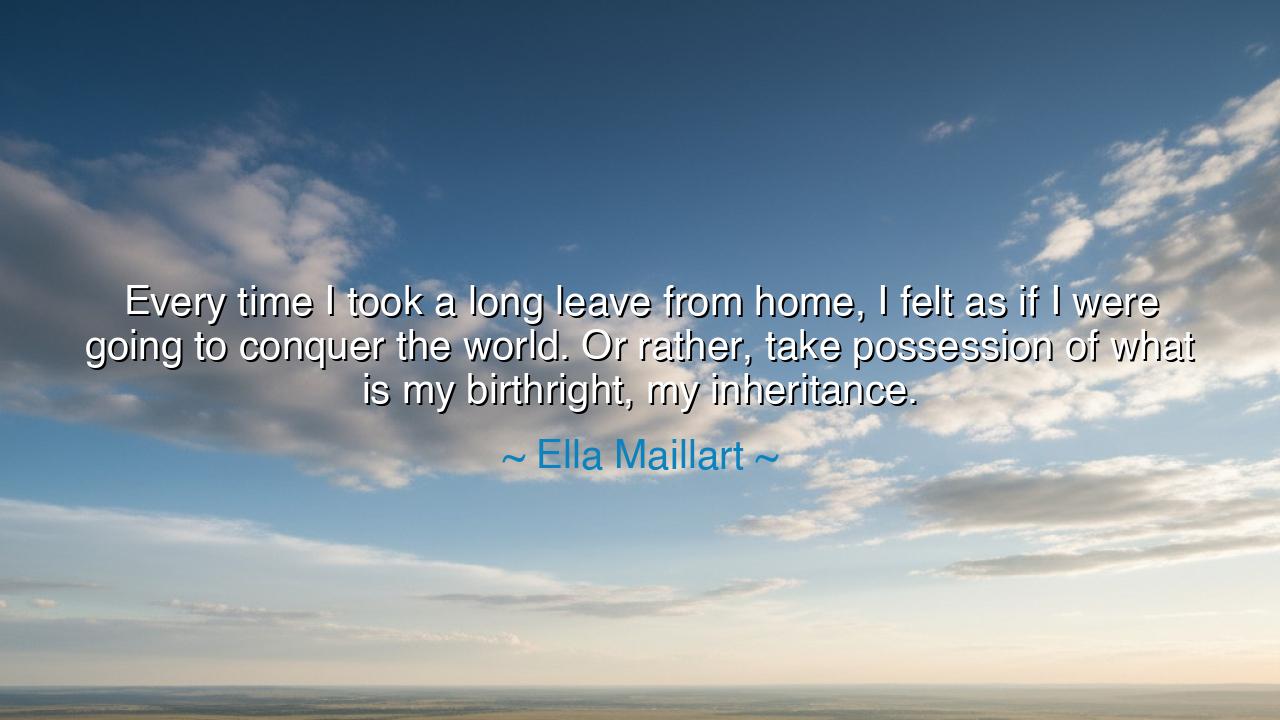
Every time I took a long leave from home, I felt as if I were
Every time I took a long leave from home, I felt as if I were going to conquer the world. Or rather, take possession of what is my birthright, my inheritance.






Hear the bold words of Ella Maillart: “Every time I took a long leave from home, I felt as if I were going to conquer the world. Or rather, take possession of what is my birthright, my inheritance.” These words shine with the fire of the adventurer’s spirit, the timeless yearning that drives men and women to cross mountains, deserts, and seas, not merely to see what lies beyond, but to claim it as part of their own soul. For Maillart, travel was not escape but affirmation—an act of courage by which she stretched out her hand and touched the fullness of life that, by right of existence, belonged to her.
When she speaks of leaving home, she means more than departing from a dwelling. She speaks of stepping beyond the safe walls of familiarity, the ordered streets of society, into the wilderness where the heart awakens. To leave home is to leave behind the known and to stride into the boundless unknown. And in that stepping forth, she felt not fear but triumph, as though she were a queen advancing into her realm, prepared to conquer the world. This conquest is not the conquest of empires or armies, but of experience, of perception, of the soul claiming what it had not yet touched.
Her correction—“Or rather, to take possession of my birthright, my inheritance”—is profound. For she acknowledges that the world does not belong to tyrants alone, nor to explorers with flags, nor to merchants with coins. It belongs to all who dare to walk upon it, to breathe its air, to drink its waters. The earth is the common inheritance of humanity, and to journey across it is to claim one’s portion, to awaken to the fullness of one’s birthright as a child of creation.
The ancients knew this well. Consider Alexander the Great, who left Macedonia not merely to expand his kingdom, but because he believed the whole world was his inheritance, given by the gods to be seen, touched, and united. Or recall Ibn Battuta, the great Moroccan traveler, who after thirty years of wandering declared that he had only begun to taste the vastness of what was his by birth as a human being. In both cases, the journey was a claiming—not of ownership in the sense of possession, but of belonging in the sense of spirit.
Maillart’s own life testifies to this truth. She traveled across Central Asia, into regions few Europeans had seen, not as a conqueror with sword but as a seeker with eyes wide open. In deserts, steppes, and mountain passes, she encountered cultures, landscapes, and struggles that became part of her own soul. She did not steal them, but received them as her inheritance, as though by walking among them she had claimed her rightful share of the earth’s wonders.
The lesson here is clear: the world belongs not to those who hoard it, but to those who dare to encounter it. Your birthright is not merely the land of your nation or the walls of your home; it is the vastness of the earth, the richness of its diversity, the beauty of its people and places. To journey forth is to claim what has always been yours by virtue of being alive. To remain forever still is to leave your inheritance unclaimed.
Practically, this means: take your own long leave from home when you can. Step beyond what is familiar, even if only into a new neighborhood, a new culture, or a new conversation. Do not let fear or routine imprison you. The earth is wide, and it calls for you. Conquer not with sword, but with openness; claim not with greed, but with wonder. Every step taken with courage is a step into your inheritance.
Therefore, O seekers of truth, let Maillart’s words be your compass. The world is vast, yet it is yours. Each time you step beyond your home, you are not fleeing but advancing into your destiny. Do not shrink back, for life itself is your kingdom. To conquer the world is not to dominate it, but to embrace it as your birthright—a treasure waiting for the brave.






AAdministratorAdministrator
Welcome, honored guests. Please leave a comment, we will respond soon